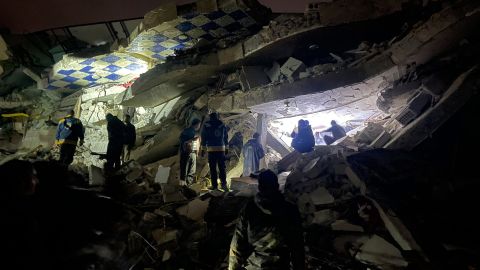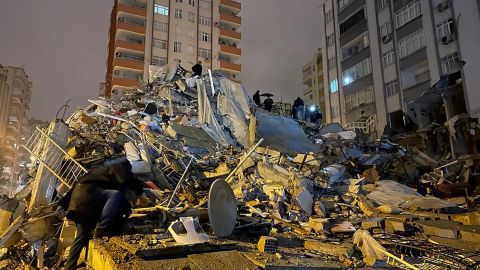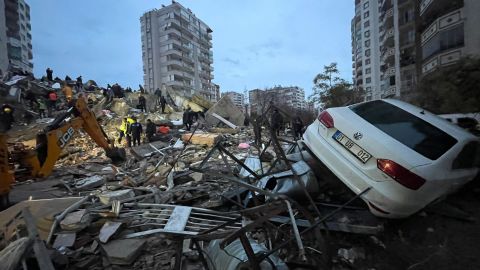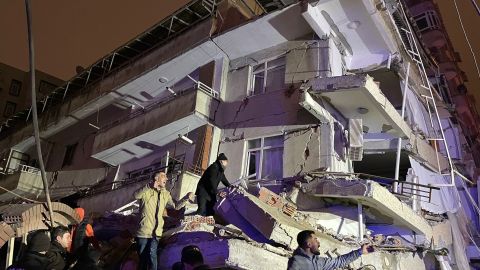Severe Earthquake in Turkey and Syria Killed 4,300
After a Severe Earthquake in Turkey and Syria Killed 4,300, leaving destruction and debris on both sides of the border, rescuers are scrambling to remove survivors from beneath the rubble.
At around 4 a.m. on Monday, one of the worst earthquakes to hit the region in a century jolted locals from their beds, sending vibrations as far away as Lebanon and Israel.
According to Turkey’s head of disaster services, Yunus Sezer, at least 2,921 people were killed and more than 15,800 were injured.
At least 1,451 individuals have killed in neighbouring Syria. According to the Syrian state news agency SANA, 711 individuals have perished in government-controlled territories, primarily in Aleppo, Hama, Latakia, and Tartus.
The “White Helmets” organisation, formally known as the Syria Civil Defense, reported 740 deaths in opposition-held regions. Anti-government forces dominate much of northwest Syria, which borders Turkey, amid a violent civil war that began in 2011.
The 7.8-magnitude quake struck 23 kilometres (14.2 miles) east of Nurdagi in Turkey’s Gaziantep province, at a depth of 24.1 kilometres (14.9 miles), according to the US Geological Survey (USGS).
Throughout the day, a series of aftershocks have resonated. According to the USGS, the strongest quake, measuring 7.5 magnitude, struck Turkey around nine hours after the initial tremor. That aftershock occurred approximately 95 kilometres (59 miles) north of the initial.

Daybreak broke over rows of fallen buildings in Turkey, some with rooms exposed to the elements, as people huddled near them in the frigid cold, waiting for aid.
Syrian rescuers (White Helmets) and civilians searched for victims and survivors amid the ruins of a collapsed building in the rebel-held northern countryside of Syria’s Idlib province, near the Turkish border, early Monday.
A number of countries have despatched rescue teams to the devastated region, where a massive effort is underway to discover and free trapped residents. A chilly and wet weather system is sweeping through the area, complicating matters even more.

According to the USGS, Monday’s earthquake was the largest to strike Turkey since 1939, when an earthquake of the same magnitude killed 30,000 people. Earthquakes of this magnitude are uncommon, with less than five happening globally each year on average. In the last 25 years, seven earthquakes of magnitude 7.0 or more have rocked Turkey, but Monday’s was the most powerful.
According to Karl Lang, an assistant professor at Georgia Tech University’s School of Earth and Atmospheric Sciences, the area affected by the quake on Monday is prone to seismic activity. “It’s a very big fault zone, but this is the largest earthquake in recent memory,” Lang added.

“We can no longer use the buildings. Perhaps for hours. Perhaps till tomorrow. I’m not sure, “Dr. Mazen Kewara, Turkey director of the Syrian American Medical Society (SAMS), spoke to CNN from near the epicentre of the earthquake in Gaziantep, where he and his family were taking refuge in their car.
“A collapsed structure is roughly 200-300 metres away from my building. “Many structures have collapsed in Gaziantep,” Kewara explained.
Following the huge earthquake that struck southern Turkey on February 6, 2023, many city blocks were demolished.

SAMS is a medical aid organisation that operates in Syria and neighbouring nations. However, their efforts to deliver assistance will be impeded by building damage.
“The earthquake has severely damaged four of our hospitals, and we have evacuated two of them.” “explained Kewara, who was born in Damascus, Syria.
“It seemed like it would never end.”
“It felt like it would never end,” said Eyad Kourdi, a CNN producer in Gaziantep who was living with his parents when the earthquake struck early Monday.
Kourdi and his dad walked out of their house in their pyjamas once the shaking subsided, he claimed.
With many inches of snow on the ground, they waited for nearly 30 minutes outside in the rain before he could return inside to get coats and boots.
Aftershocks were felt strongly in southern and central Turkey. An aftershock of magnitude 6.7 struck around 32 kilometres (20 miles) northwest of the original quake’s epicentre about 11 minutes later. Another powerful aftershock with a magnitude of 5.6 followed 19 minutes later.
After the earthquake in Adana, Turkey, a wrecked flat and a damaged vehicle were discovered in the Yurt area of the Cukurova district.
Kourdi compared Monday’s aftershocks to “Armageddon.”
“I genuinely don’t think I made it out,” Kourdi claimed, adding that as it started, his parents screamed and he tried to soothe them down by assuring them it will be over soon.
After the 7.8-magnitude earthquake occurred, Kourdi reported up to eight “extremely strong” aftershocks in less than a minute, forcing everything in his home to fall to the ground. Many of his neighbours had fled their homes after the earthquake, he added.
He then went to Pazarcik, a nearby village, and stated the situation was “far more dreadful.”
It felt like the shaking would never stop at my parents’ house in Turkey.
Photos reflecting the actual magnitude of the devastation surfaced as the day broke in Turkey.
Entire buildings have been demolished, and metal rods are strewn throughout the streets. Cars have overturned as bulldozers struggle to clean the rubble. Gaziantep Castle has suffered significant damage.
According to CNN meteorologists, a winter storm in the area is worsening the crisis.
“This affects hundreds of thousands of individuals.” It’s freezing outside. It’s pouring outside. “Roads might be impacted, which means your food, your livelihood, your children’s care, and your family’s care,” CNN meteorologist Karen Maginnis said.
“Anything growing in this region, including crops, will be damaged as well.” “The implications are far-reaching and will have an impact on this region for weeks and months.”
Meanwhile, Syria’s condition appears to be dire. According to the UN Office for the Coordination of Humanitarian Affairs, more than 4 million people rely on humanitarian aid in the northwest Syrian region where the catastrophic earthquake struck (OCHA).
The vast majority of these individuals are women and children. Along with the devastation caused by the earthquake, Syrian towns are dealing with a continuing cholera outbreak during a harsh winter that included heavy rain and snow over the weekend, according to OCHA.
According to eyewitnesses in northwest Syria, the aftermath of the earthquake has been “terrifying,” with “entire families dead” and “survivors lying on the streets in the frigid cold.”
Dr. Mostafa Edo, a Country Director for the US-based NGO MedGlobal and one of the eyewitnesses who has lived in Idlib for the past three years, said: “One of my colleagues, who I’ve worked with for more than five years, was killed roughly two years ago in Russian airstrikes.”
I discovered out today that his entire family—his wife and children—died when their building collapsed.”
Another eyewitness, Khalil Ashawi, a photojournalist based in Jindayris in Syria’s northwest, says that in his ten years of covering the war in Syria, he hasn’t seen something as “disastrous” as what he saw on Monday.
“Paramedics and firefighters are attempting to assist, but there is simply too much for them to handle.” They can’t handle everything.
According to Syria’s Directorate-General for Antiquities and Museums (DGAM), the earthquake destroyed multiple archaeological sites in Syria, including the Imam Ismail Mosque, the Shmemis Castle in the Hama Governorate, and the 13th-century Aleppo Citadel.
Syria’s old city of Aleppo, located in the country’s northwest, has been severely destroyed by the country’s ongoing civil conflict. According to DGAM, artefacts inside Aleppo’s National Museum were also damaged in Monday’s earthquake.
Looking for survivors Severe Earthquake in Turkey
Suleyman Soylu, Turkey’s interior minister, said search and rescue teams had been despatched to the country’s south. AFAD stated that it had requested foreign assistance through the European Union’s humanitarian initiative, the Emergency Response Coordination Center (ERCC).
According to the governor of Turkey’s largest city, Istanbul, almost 1,000 search and rescue volunteers, as well as dogs, trucks, and equipment, have been deployed.
The World Health Organization’s network of emergency medical teams in both nations has been launched to aid anyone affected by the earthquake, according to a tweet from the organization’s director general. In his broadcast address, Erdogan also stated that NATO, the European Union, and dozens of other countries have offered assistance.
Davut Gul, the governor of Gaziantep, wrote on Twitter that “the earthquake was felt powerfully in our city” and asked residents to wait outside their homes and remain calm.
“Please, let us wait outside calmly.” Let us refrain from driving. Let’s not overcrowd the key thoroughfares. “Let’s not keep the phones ringing,” he said.
According to Brookings Institute fellow Asli Aydintasbas, Gaziantep province contains a number of small and medium-sized cities with a substantial refugee population.
Many people are buried beneath the rubble and are being rescued.
Anadolu Agency/Getty Images/Omer Yasin Ergin
“Some of these areas are quite deplorable.” Some are more rich, urban places…”But other locations that appear to have been decimated are comparatively lower-income areas,” she explained.
Video from Diyarbakir, northeast of Gaziantep, shows rescue personnel desperately trying to remove people from the rubble.
Erdogan stated that the quake was felt throughout the country.
“I extend my heartfelt condolences to all of our countrymen who have been afflicted by the earthquake that struck Kahramanmaraş and was felt throughout our country. “All our relevant units are on alert, coordinated by AFAD,” Erdogan said on Twitter.
As world leaders awoke Monday morning to the news of the terrible earthquake, messages of grief and support began to come in.
According to White House National Security Adviser Jake Sullivan, the US is “profoundly concerned” about the destruction in Syria and Turkey.
“I have informed Turkish officials that we are prepared to provide any and all support that is required. We will continue to keep a close eye on the issue in collaboration with Turkiye “Sullivan tweeted about it.

